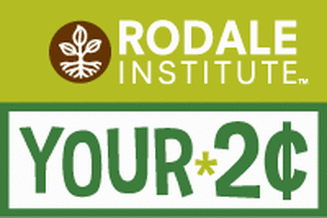
I even accredit my foodlust to an article I read by the Rodale Institute in 2008 about mycorrhizal fungi. It rocked my world sending me on the journey I'm still fascinated by! Last fall I took a soils class at Rodale by the Jane Goodall of soil, Dr. Elaine Ingham. While there, the institute's new Executive Director, Mark "Coach" Smallwood, told me about their new grants program, Your Two Cents which supports aspiring organic farmers. At the time, I had no idea I would become an organic farmer. But when I did, I applied for the grant during their inaugural call for applications this past spring. And two weeks ago, Coach called to share the good news...The Truckee Community Farm had been awarded the grant and was one of the grants first two recipients. We were overjoyed! To be recognized by your hero affirms that the work you are doing matters.
The Rodale Institute will be issuing a press release in the coming weeks. In preparation, they asked both myself (the farm manager) and the owner of the growing dome at Truckee Community Farm, Bill Kelly, to answer the following questions. Here's what I had to say...
What is your personal vision? What drives you – gets you out of bed every day? Learning more about ecological farming and helping to build a sustainable food community in Tahoe, are the two things that drive me. I’ve always liked to think big but I thought that meant you had to change things on a national scale. I’ve worked for a national magazine, ran a national film festival tour, managed athletes coast to coast, etc. But the real change comes at the local level where you can connect with people and see the change happening. Building community gives you something nothing else can…a sense of place!
What do you think is standing in the way of organic and sustainable being our primary agriculture system? I think the biggest thing standing in the way of organic agriculture becoming the norm is demand. The industrial, agricultural complex uses supply to keep a choker hold on our food system flooding the market with its refined, processed and corn-based foods. Sustainable, organic agriculture can win playing the other side of this economic model, demand! The concept is simple...if we increase demand for organics, supply will meet it.
Once people realize what they are doing to their bodies and the earth, demand will increase and the scales will tip. Media is one way to accomplish this goal…Instead of always making a comparison between conventional and organic as to which is better, demonstrate the science that soil dies when treated with chemicals. We dumb down the debate and as a result people don’t take it serious. But with the right knowledge, like with the labeling of GMO foods, media could help to turn the tides by creating a revolution.
Demand may come from an unlikely player...our healthcare system. People are treated for disease and chronic pain with treatments, surgeries and prescriptions. Instead, diet and nutrition need to be an integral part of how we care for people. It is apparent the system is broken when you look at what patients are being served in hospitals. Just like we need to watch the pH of the soil we need to watch the pH of our bodies and ensure we are not too acidic from refined grains and sugars. With the help of organizations like Healthcare Without Harm, medical institutions are starting to connect the concept of "Eat well, be well!" Their motives may not be all together altruistic. But no matter what the drive, change is coming…the medical industry does not want to flip the bill for the litany of food related diseases which are continuing to plague our country like diabetes, obesity and heart disease. The Healthcare system will be the ones to pressure "BIG Ag" to change their ways helping to transition conventional farms to more sustainable growing methods in order to keep up with the demand of healthy food being perscribed by people's doctors..
What tool couldn’t you live without? That’s a tough question because at present, I manage an 850sqft geodesic greenhouse with raised beds. I don’t use big equipment or even a hula-hoe. I have two hand tools, a trowel and shovel, and of course something to turn the compost. But because it is a greenhouse and we don’t get a lot of pollinators, I guess I would have to say my electric toothbrush is the tool I can’t live without. I use it for pollinating the tomatoes. I learned that trick from a friend who learned it from a friend. So far it is working. And every time I use it, I feel like a fairy spreading angel dust! Ahh, isn’t that sweet!
What do you see as the biggest hope for the next generation when it comes to food and farming? The biggest hope I see for the next generation is the potential for farming to be a green career with loads of job opportunities. It may not be a return to full on agrarianism but the next generation of farmers will build hybrid careers around farming creating a lifestyle that reconnects them to the land and a way to feed themselves and their community good, clean and far food.

 RSS Feed
RSS Feed
